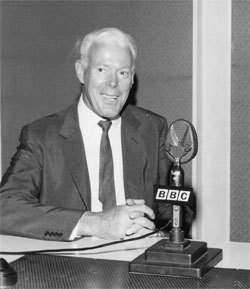Changing (2) Zubari for November (Year unknown)
Trevor Leggett was head of the Japanese Department of the BBC.

This is one of his broadcasts to Japan
This is the second part of a Zubari piece, the first part of which is not yet found.
Zubari for November (Year unknown)
He reminds me of a famous British scholar of Arabic and Persian, who was a great expert in the literature, but was not very fluent in speaking either of these languages. His University, the University of London, sent him on a tour of the Middle East, and as he was such a famous man, his visit was quite an event. The Arabic scholars at Cairo organized a big meeting to greet him, and so did the Persian scholars at Teheran. Of course, he knew that at these big meetings he would be expected to give an address in the language of the country. I was told by a friend who knew him well that the Professor prepared two speeches, almost identical in content, but one in Persian and one in Arabic. The two languages are related, but not the same. However, nearly all Arabic scholars know some Persian, and nearly all Persian know some Arabic.
When the Professor got to the Cairo meeting, the president gave him a great welcome, speaking in Arabic of course, and then asked him to address the meeting. The Professor got up and said that he hoped the meeting would excuse him from speaking in Arabic, because of though he had of course studied the literature of course, he had not spoken Arabic for a long time; he would like therefore to address them in Persian. He said that he presumed that his audience, all scholars, would understand him perfectly. He then gave his address in Persian. He knew there would be a few Persian scholars there whose Persian would be good enough really to criticize them.
When he got to Teheran, he did the same thing, but in reverse. He addressed the meeting in Arabic. In this way, the Persians thought he was a wonderful Arabic scholar, and the Arabs thought he was a wonderful Persian scholar.
© Trevor Leggett